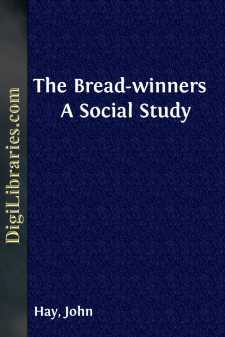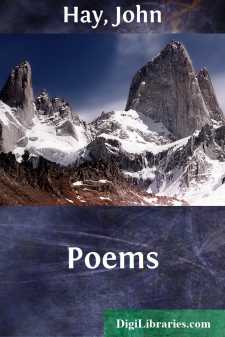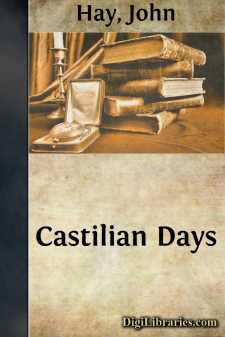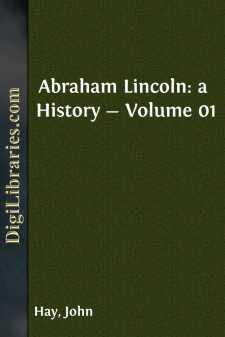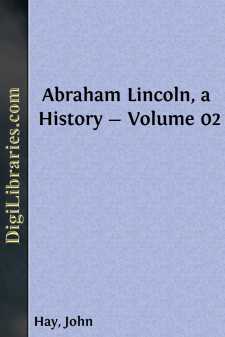Categories
- Antiques & Collectibles 13
- Architecture 36
- Art 48
- Bibles 22
- Biography & Autobiography 813
- Body, Mind & Spirit 142
- Business & Economics 28
- Children's Books 17
- Children's Fiction 14
- Computers 4
- Cooking 94
- Crafts & Hobbies 4
- Drama 346
- Education 46
- Family & Relationships 57
- Fiction 11829
- Games 19
- Gardening 17
- Health & Fitness 34
- History 1377
- House & Home 1
- Humor 147
- Juvenile Fiction 1873
- Juvenile Nonfiction 202
- Language Arts & Disciplines 88
- Law 16
- Literary Collections 686
- Literary Criticism 179
- Mathematics 13
- Medical 41
- Music 40
- Nature 179
- Non-Classifiable 1768
- Performing Arts 7
- Periodicals 1453
- Philosophy 64
- Photography 2
- Poetry 896
- Political Science 203
- Psychology 42
- Reference 154
- Religion 513
- Science 126
- Self-Help 84
- Social Science 81
- Sports & Recreation 34
- Study Aids 3
- Technology & Engineering 59
- Transportation 23
- Travel 463
- True Crime 29
John Hay
John Hay (1838–1905) was an American statesman, diplomat, and writer who served as private secretary to President Abraham Lincoln and later as Secretary of State under Presidents William McKinley and Theodore Roosevelt. He played a key role in shaping U.S. foreign policy, particularly through the Open Door Policy in China and negotiating the Hay-Pauncefote Treaty, which facilitated the construction of the Panama Canal. Hay was also a prolific author, known for his poetry, essays, and the co-authored biography "Abraham Lincoln: A History". His work as a writer and diplomat left a lasting impact on American politics and literature.
Author's Books:
Sort by:
by:
John Hay
I. A MORNING CALL A French clock on the mantel-piece, framed of brass and crystal, which betrayed its inner structure as the transparent sides of some insects betray their vital processes, struck ten with the mellow and lingering clangor of a distant cathedral bell. A gentleman, who was seated in front of the fire reading a newspaper, looked up at the clock to see what hour it was, to save himself the...
more...
by:
John Hay
POEMS By John Hay Note to Revised Edition The Publishers of this volume, desiring to print it in an improved form, have asked me to write something by way of preface or supplement to the new edition. After some deliberation I have found myself unable to comply with this request. These pages were written in the first half of the year 1870, a time of intense interest and importance, to Spain. I left...
more...
by:
John Hay
MADRID AL FRESCO Madrid is a capital with malice aforethought. Usually the seat of government is established in some important town from the force of circumstances. Some cities have an attraction too powerful for the court to resist. There is no capital of England possible but London. Paris is the heart of France. Rome is the predestined capital of Italy in spite of the wandering flirtations its...
more...
by:
John Hay
A generation born since Abraham Lincoln died has already reached manhood and womanhood. Yet there are millions still living who sympathized with him in his noble aspirations, who labored with him in his toilsome life, and whose hearts were saddened by his tragic death. It is the almost unbroken testimony of his contemporaries that by virtue of certain high traits of character, in certain momentous...
more...
by:
John Hay
CHAPTER I JEFFERSON DAVIS ON REBELLION Sumner to Howard, May 16, 1856. Ibid., p. 37. Shannon to Sumner, May 21, 1856. Senate Ex. Doc., 3d Sess. 34th Cong. Vol. III., p. 38. 1856. Shannon to Sumner, June 4, 1856. Senate Ex. Doc., 3d Sess. 34th Cong. Vol. III., p. 45. While the town of Lawrence was undergoing burning and pillage, Governor Shannon wrote to Colonel Sumner to say that as the marshal and...
more...


